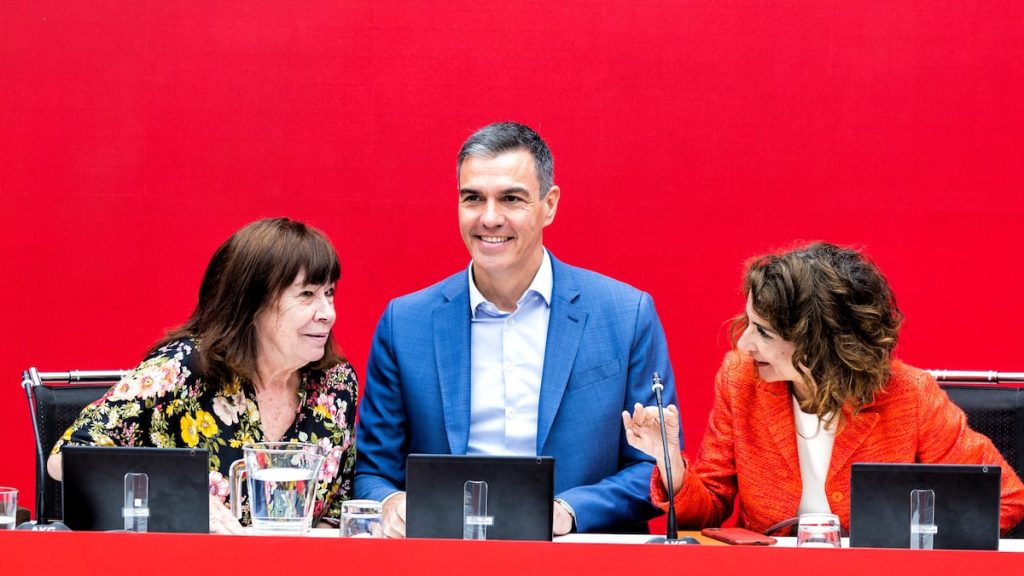The PSOE will arrive at the next summer with its territorial leadership renewed. Pedro Sanchez had until the fall of 2025 to convene the 41st Federal Congress, but he has decided to accelerate the deadlines and have the big summit of the socialists in November, as confirmed to EL PAÍS by various socialist sources, who suggest that the chosen city will be Seville. The federal executive will approve the celebration of the federal committee on Monday, September 7 with one goal: to rearm the party, gaining a year over the maximum planned calendar—the previous Federal Congress was in October 2021 in Valencia—with a view to the next electoral cycle. The rush of the PSOE is mainly due to the fact that the elections in Andalusia, where Juan Espadas faces significant internal opposition, will be by no later than June 2026.
The advance of the Federal Congress will allow Sanchez to undertake a renewal of the current executive where, without a congress in between, significant changes have occurred such as the resignation of Adriana Lastra, who was Sanchez’s number two, and her replacement by María Jesús Montero. Both the unconditional supporters and internal critics of Sanchez agree that the current leadership is very numerous, with around fifty members, and therefore inefficient. The Government and the PSOE already delved into the merger in January, at the A Coruña Political Convention, with the incorporations of ministers Óscar Puente, Elma Saiz, Jordi Hereu and Ana Redondo that Sanchez had previously supported in Valencia. But only a Federal Congress would justify a formal and thorough remodeling of the socialist leadership. Its celebration will be the first stop on the roadmap planned at PSOE headquarters. The goal is long-term: to activate the renewal of the entire party structure. And this can only be guaranteed by a Federal Congress: the party’s statutes establish that in the following months, in cascade, the regional, county, and local congresses would take place. Seven of the 17 territorial leaders have been in office for three years or more.
The distant leaders from Sanchez have a different interpretation: the Federal Congress will soften the internal dissatisfaction with the last pact with the independence movement and its electoral impact in the rest of Spain. It will also take place in an autumn when Junts will clarify its leadership in the congress in October and ERC in November. An unpredictable scenario in which the Government faces the challenge of approving the General Budgets of 2025. Its extension, which would be the second consecutive one and the sixth in a decade, is on the table. Not to mention the Government crisis that Sanchez will have to address if the third vice president Teresa Ribera becomes a European Commissioner. Another minister, José Luis Escrivá, is likely to become the governor of the Bank of Spain. The Government must appoint the chosen person before September 10. Nobody in the PSOE or in the Government dares to rule out further changes: the final decision will lie with Sanchez.
Amidst so much uncertainty, the need to give a boost to Andalusia is one of the key factors that has led Sanchez to decide not to wait until spring to hold the federal conclave and activate the calendar. Despite the gradual recovery in the Andalusian federation, the numbers do not add up in La Moncloa and Ferraz, where they are aware that Salvador Illa’s strength in Catalonia alone is not enough to retain power in the next general elections and therefore they need to improve their results in the rest of the country. A very difficult recovery after the wear and tear accumulated by the amnesty law in the last year and for the past month by the unique financing for Catalonia, which ERC and critical barons consider to be an economic agreement similar to that of the Basque Country.
The most populous region in Spain is not the only concern of the PSOE, which in the municipal and regional elections of 2023 lost almost all its territorial power. Sánchez’s move has an added explanation: Javier Lambán, former president of Aragon and secretary general of the federation of Aragon, has announced that he will not run for re-election but has made it clear that he will not convene an extraordinary congress to bring forward the debate on his succession. Lambán is, along with the president of Castilla-La Mancha, the most publicly outspoken critic of Sanchez’s relaxation strategy for Catalonia. The Aragonese executive rejected, with the absence of members from the province of Huesca, the tax agreement for Catalonia, considering it to be detrimental to the community’s interests. Another former president, Concha Andreu of La Rioja, who is in line with Sanchez, has also announced that she will not continue leading her federation but has not called for a congress. Extremadura, the Valencian Community, and Galicia have resolved their replacements through extraordinary processes in recent months.


